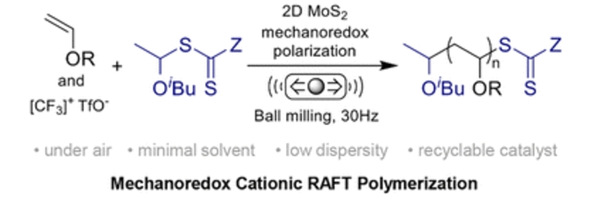Mechanically induced cationic reversible addition-fragmentation chain transfer polymerization of vinyl ethers
Longfei Zhang1, Xiuyang Zou2, Chengqiang Ding1, Zhao Wang1(王召)*
1State and Local Joint Engineering Laboratory for Novel Functional Polymeric Materials, Jiangsu Key Laboratory of Advanced Functional Polymer Design and Application, Suzhou Key Laboratory of Macromolecular Design and Precision Synthesis, College of Chemistry, Chemical Engineering and Materials Science, Soochow University, Suzhou 215123, China.
2Jiangsu Province Engineering Research Center of Environment Functional Materials, School of Chemistry and Chemical Engineering, Huaiyin Normal University, Huaian 223300, China
Chem. Sci., 2024,15, 18977-18984
Abstract: Mechanoredox catalysis has emerged as a sustainable approach for organic transformations. Mechanically controlled polymerization that uses mechanoredox catalysts enables synthesis of complex polymers and mechanoresponsive materials with diverse applications. Despite its potential, the focus has predominantly been on free radical polymerization and acrylate monomers. The mechanochemical synthesis of poly(vinyl ether)s (PVEs) poses a significant challenge in the field. Herein, we report an efficient mechanically induced cationic reversible addition–fragmentation chain transfer (mechano-cRAFT) polymerization using 2D MoS2 as a mechanoredox catalyst, where free radical intermediates can be further oxidized to cations to promote cationic polymerization of vinyl ethers. This mechano-cRAFT polymerization can be conducted in air and with minimal organic solvent, resulting in quantitative monomer conversion. This strategy is applicable to a range of vinyl ether monomers, yielding polymers with controlled molecular weight and narrow dispersity. We also performed trapping experiments to investigate the piezoelectrically mediated redox process, and further validated the mechanism through density functional theory (DFT) calculations.

Article information: //doi.org/10.1039/D4SC05263